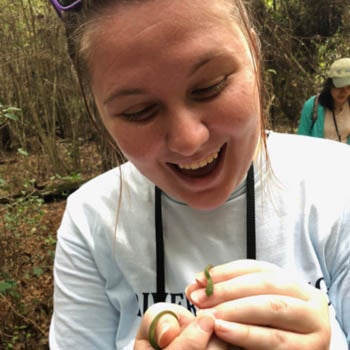Major: Ecology and Evolutionary Biology
Minor: Neuroscience
Research Advisor: Adrienne Correa
After graduation, “I hope to go into zookeeping and conservation work with a strong public outreach component,” said senior Ecology and Evolutionary Biology (EEB) major Kelsey Sanders. “A large part of the decision to pursue a career in zookeeping was because of the experience I had as an intern with the herpetology department at the Houston Zoo during Spring 2020.”
While Sanders now feels a strong commitment to a career in ecology, this hasn’t always been the case. “I came to Rice absolutely certain that I was going to be a biochemistry major...but that isn't how it turned out, of course. I ended up taking Dr. Scott Egan's Evolution course my freshman year and loved it, so ultimately decided to switch,” she explained.
“What I love about biochemistry is the molecular, laboratory based investigative approaches but what I love about ecology and evolutionary biology is the kind of big picture questions we address. I found that through the EEB program at Rice, with its emphasis on research, I have been able to combine different types of methodologies to tackle the kinds of questions that I'm really passionate about,” Sanders said.
Through her work in Adrienne Correa’s lab, Sanders has utilized both field work and molecular biology to investigate the communities of microbes living on and in corals. For example, she uses DNA sequencing techniques to tell her which microbes are present in her coral samples. Before she can do that, she has to collect the samples in the field. “I had the opportunity two years ago to go on a week-long research cruise in the Gulf of Mexico,” Sanders said. Now, for her senior thesis, she’s applying this skillset to investigate “how low salinity stress impacts coral hosts and their associated microbes,” she said.
“I love this major because you learn by being immersed directly in the forefront of investigation,” said Sanders. “My favorite class was EBIO 319, which is the Tropical Field Biology course in Belize.” Through this course, students spend 2 weeks in the Central American country of Belize studying firsthand topics such as tropical biodiversity, coral reef formation, rainforest ecology, and symbiosis. “EBIO 319 is an incredible opportunity and not something I would have been able to do without generous financial support from Rice,” said Sanders.
The Ecology and Evolutionary Biology program offers other experiential learning courses closer to home. One of Sanders’s favorites was EBIO 327, Biodiversity Lab. “In EBIO 327 you go with Dr. Scott Solomon to do an overnight short-term diversity survey of the Big Thicket National Preserve in Texas.You have the opportunity to work at almost every step of the investigative process. You don't have to go about getting your own permits or funding, but you do write your own plan, execute the survey, and write a paper afterwards and a presentation detailing your findings.”
In case her coursework and extracurricular research weren’t enough, Sanders found herself growing as a scientist in an unexpected way: through theatre. “ I've been lucky enough to make and design costumes for a few shows and wrote my own show that had a staged production done by the Rice Players during Fall 2019,” she said. “I think the theatre especially has improved my experience as a science major because it has helped me develop stronger communication skills that I can then bring to my research. Writing a play or designing a costume isn't all that different from writing an abstract or designing a poster: you have a story you're trying to tell an audience. Theatre has helped me think more critically about the ways to tell a story and to think more openly and creatively.”

